ESG & CSR For Water Conservation Industry
Case Study: Nationwide Water Conservation Awareness Program by Earth5R (2015-2023)

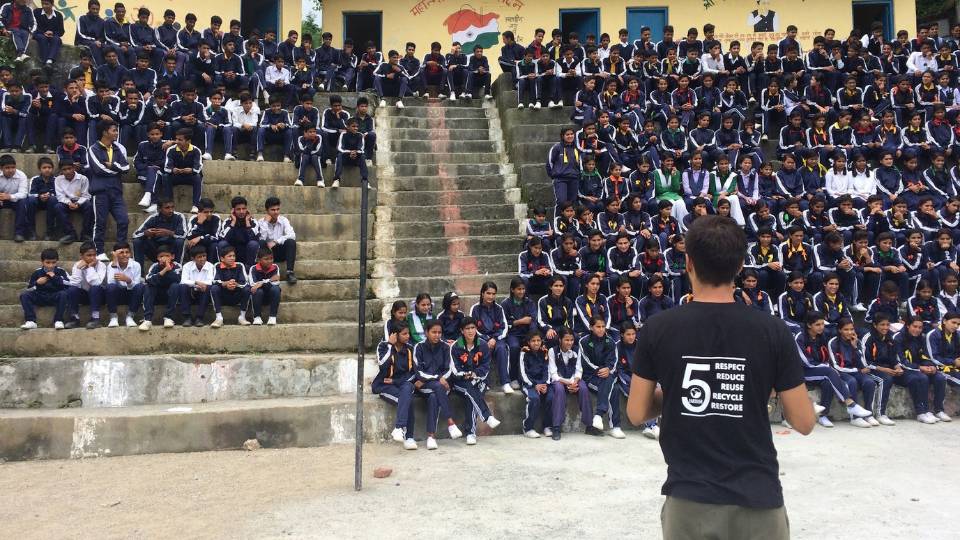
INTRODUCTION
India faces increasing water stress due to rapid urbanization and growing demand for water resources. To address this problem, Earth5R initiated a nationwide water conservation awareness program from 2015 to 2023. This program involved 3,500 volunteers who trained and educated residents on rainwater harvesting, wastewater recycling, and the adoption of water-efficient technologies. The initiative resulted in significant water savings and promoted sustainable water management across the country.
PROBLEM STATEMENT
Urban areas in India heavily relies on external water sources, often at the expense of groundwater and local ecosystems. Water wastage is at an all-time high due to outdated infrastructure and a lack of awareness around water conservation practices. Without interventions such as rainwater harvesting, wastewater recycling, and reusing methods, urban areas will continue to face severe water shortages, especially during dry seasons.


EARTH5R'S INTERVENTION & SOLUTION
- Volunteer-Led Water Conservation Campaign: Starting from 2015 till 2023, 3,500 Earth5R volunteers led awareness efforts in residential buildings across India. Each volunteer engaged one new building per month, educating residents about water conservation methods, including wastewater recycling, rainwater harvesting, and reusing water via updated equipment like spray-based faucets and efficient taps.
- Sustained Outreach Effort: Over the 8-year period, the volunteers reached a total of:
- 3,500 volunteers x 12 months/year x 8 years = 336,000 buildings which received awareness programs on water conservation practices.
- Implementation of Water Conservation Systems: Out of these buildings, 7% adopted some form of water conservation technique, including rainwater harvesting, wastewater recycling, and equipment upgrades. This resulted in:
- 336,000 buildings x 7% = 23,520 buildings implementing water conservation methods.
- Water Savings: On an average, each building that adopted water conservation measures reduced its water consumption by 5,000 liters per month via rainwater harvesting, wastewater reuse, and updated water systems. The total monthly water savings were:
- 23,520 buildings x 5,000 liters/month = 117.6 million liters of water saved per month.
- Over one year, this amounted to:
- 117.6 million liters/month x 12 months = 1.411 billion liters saved annually.


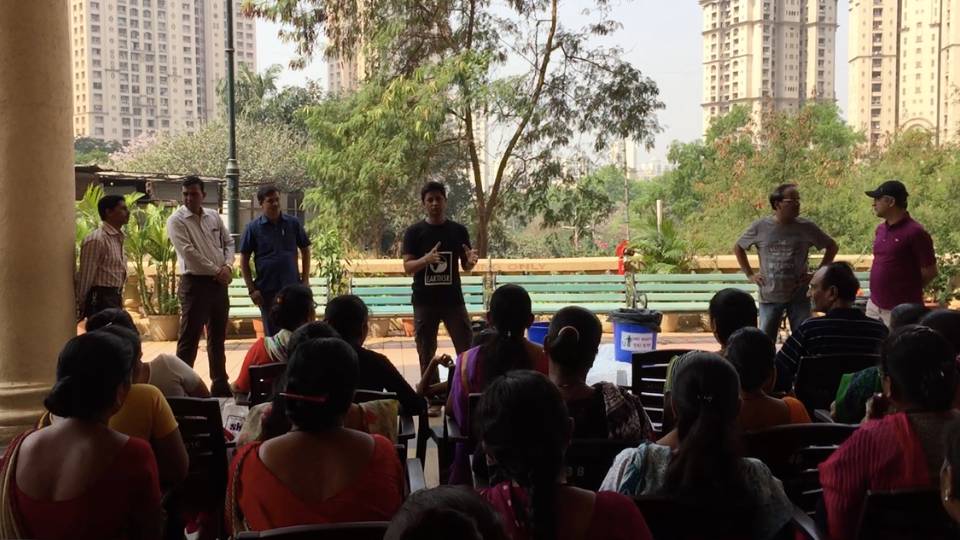
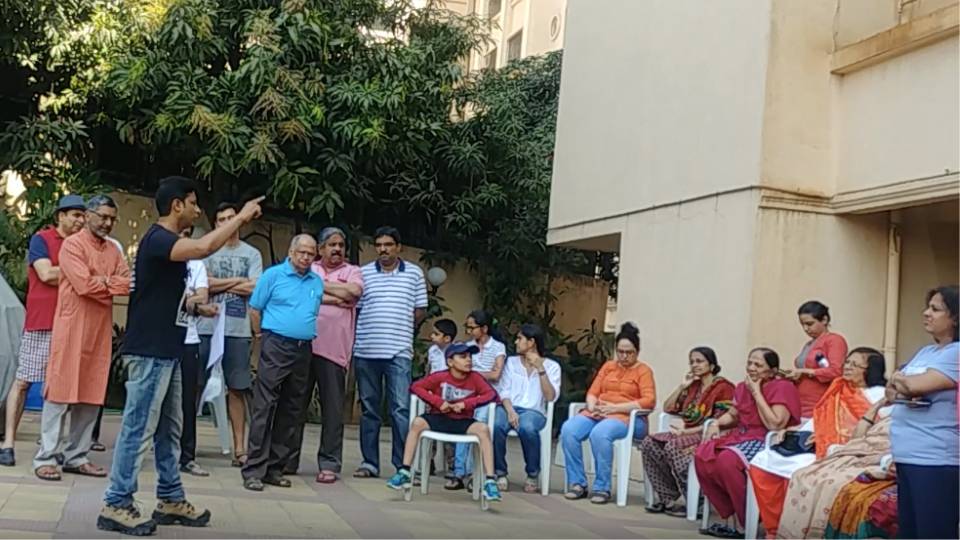
OUTCOMES
- Total Water Saved:
- Over 8 years, the total water saved across all participating buildings was:
- 1.411 billion liters/year x 8 years = 11.288 billion liters of water saved.
- Over 8 years, the total water saved across all participating buildings was:
- Carbon Offset:
- By reducing the requirement for energy-intensive water extraction and transportation processes water conservation methods offset carbon emissions. Saving 1,000 liters of water can avoid 0.37 kg of Carbon Dioxide emissions. Therefore, the total carbon offset over 8 years was:
- 11.288 billion liters / 1,000 liters x 0.37 kg CO2 = 4,177.56 tonnes of Carbon Dioxide emissions avoided
- 11.288 billion liters / 1,000 liters x 0.37 kg CO2 = 4,177.56 tonnes of Carbon Dioxide emissions avoided
- By reducing the requirement for energy-intensive water extraction and transportation processes water conservation methods offset carbon emissions. Saving 1,000 liters of water can avoid 0.37 kg of Carbon Dioxide emissions. Therefore, the total carbon offset over 8 years was:
- Economic Impact (Cost Savings):
- The average cost of water in urban India is around Rs. 20 per 1,000 liters. The total cost savings due to water conservation practices over 8 years were:
- 11.288 billion liters / 1,000 liters x ₹20 = ₹225.76 million (₹22.57 crores).
- The average cost of water in urban India is around Rs. 20 per 1,000 liters. The total cost savings due to water conservation practices over 8 years were:
- Volunteering Hours:
- Each volunteer committed at least 5 hours per month to the awareness initiatives. Over the course of eight years, the total volunteer hours contributed were:
- 3,500 volunteers x 5 hours/month x 12 months/year x 8 years = 1,680,000 volunteer hours.
- Each volunteer committed at least 5 hours per month to the awareness initiatives. Over the course of eight years, the total volunteer hours contributed were:
- ESG KPIs:
- Environmental Impact:
- Total water saved: 11.288 billion liters.
- Carbon offset: 4,177.56 tonnes of Carbon Dioxide emissions avoided.
- Increased use of rainwater harvesting measures and wastewater recycling systems across India.
- Social Impact:
- 1.68 million volunteer hours dedicated to water conservation by Earth5R volunteers.
- 23,520 buildings adopted water conservation systems which promoted sustainable water use at the community level.
- Economic Impact:
- ₹22.57 crores in water cost savings caused by reduced consumption.
- Environmental Impact:
- Behavioral Change:
- The program led to a vital behavioral shift among residents, with more buildings adopting water-saving measures and practices. By spreading awareness around water scarcity and conservation, Earth5R helped communities engage in long-term sustainable water management.


IMPACT ON WATER RELATED BUSINESS
This large-scale water conservation program presents a valuable opportunity for firms in the water industry, such as Coca-Cola, PepsiCo (Aquafina), and Bisleri, to collaborate with Earth5R. These companies are deeply invested in water sustainability and could use Earth5R’s initiative to align with their ESG goals, reduce their water footprint, and directly involve communities in promoting water-saving practices.
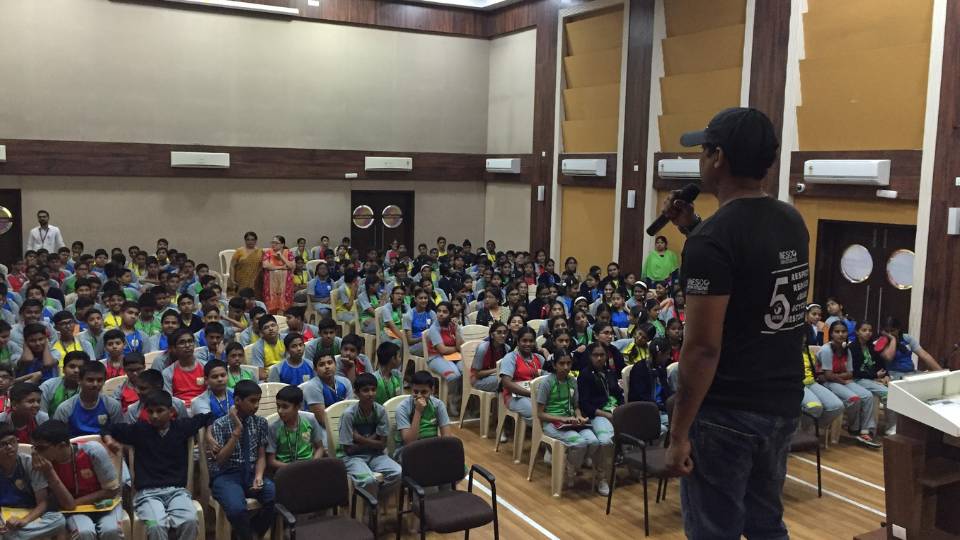
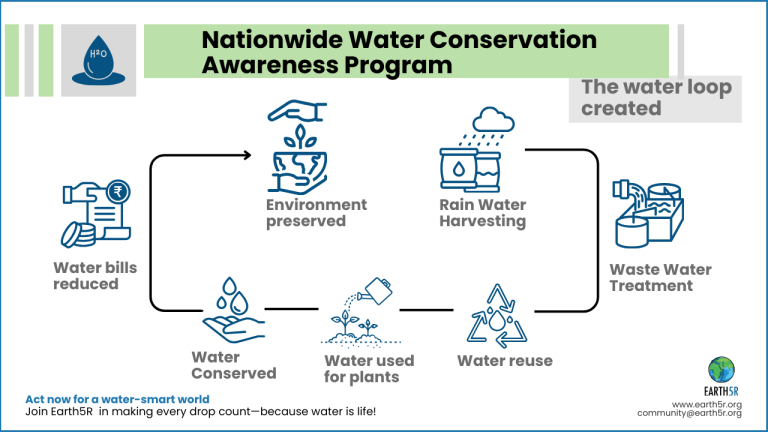
THE ROAD AHEAD
With the phenomenal success of this project, Earth5R plans to extend its water conservation efforts to more cities which includes corporate buildings and industrial areas. By continuing to promote water-efficient technologies and sustainable methods, Earth5R aims to make a long-term impact in India’s water-stressed urban areas.

ABOUT EARTH5R
Earth5R is an ESG and CSR “Action” platform that engages communities to take meaningful action on ecological and environmental issues. With Focus on water management, waste management, and sustainability education, Earth5R has made a huge environmental, social, and economic impact through its citizen-backed initiatives.
